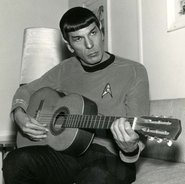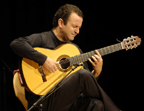Welcome to one of the most active flamenco sites on the Internet. Guests can read most posts but if you want to participate click here to register.
This site is dedicated to the memory of Paco de Lucía, Ron Mitchell, Guy Williams, Linda Elvira, Philip John Lee, Craig Eros, Ben Woods, David Serva and Tom Blackshear who went ahead of us.
We receive 12,200 visitors a month from 200 countries and 1.7 million page impressions a year. To advertise on this site please contact us.
|

|
|
RE: Music Theory: Why?
|
You are logged in as Guest
|
|
Users viewing this topic: none
|
|
Login  | |
|

   
Kevin
Posts: 294
Joined: Sep. 7 2008

|
 RE: Music Theory: Why? (in reply to Ricardo) RE: Music Theory: Why? (in reply to Ricardo)
|
|
|
quote:
a HUGE percentage of flamenco has EASTERN ELEMENTS
quote:
At a point, it just breaks down and totally DIFFERENT description is required.
Whether you are studying history or music theory, or learning to play the guitar, you begin with simple and move to advanced, from particular to general, from concrete to abstract (and back to concrete). The problem is comments like these assume a ready made system in the present that does not account for its historical evolution.
Flamenco in 1895 was relatively simple. The early players/accompanists used very basic chords and played for the most part "a cuerda pelá." The short melodies were played with the thumb and were (for the most part) diatonic. Western music theory (if one so chooses to utilize it) explains this early flamenco very well. Most of the non-chord tones can be explained as either ostinatos (not drones imo) or decorative notes arising from the limitation of the guitar (AND THE EARLY players).
Ramon Montoya introduced some cool relations and a broader understanding of the possibilities of the guitar. Then Paco really furthered its possibilities by incorporating advanced harmonies. What had been mostly diatonic material gets treated to progressively chromatic instantiations of diatonic conventions.
Taking an approach that is historical and recognizing that you can't account for all the possibilities of the flamenco guitar in one lesson, it is possible to use Western theory as a BEGINNING point. If you compare flamenco with early Baroque guitar the similarities are overwhelming. The Andalusian Cadence is encountered in both. Strumming emerges in Baroque guitar (or perhaps even in Renaissance as Estebanana pointed out in another thread long ago). What is different is a matter of convention but the materials are strikingly similar. It's like giving two cultures the same bricks, mortar and other materials. They will come up with different edifices. The materials are the same. Then one culture decorates its interior according to its taste.
I concede that utilizing Western theory is problematic, BUT it is not impossible. Do you use scale-chord theory a la Rameau, or Function theory a la Riemann, a combination? It all depends on whether you value musical analysis and theory. It also depends on whether you are culturally sensitive and are aware of multiple problems arising in using Western theory. AND, it is important, at least to me that any theory be BOTH 1) practical (it arises with analytical engagement with real composers and music, and 2) aware of the social/cultural/historical contexts in which flamenco compositional practices emerge.
_____________________________
|
|
|
|
REPORT THIS POST AS INAPPROPRIATE |
Date Feb. 2 2015 18:59:07
 |
|

   
Paul Magnussen
Posts: 1805
Joined: Nov. 8 2010
From: London (living in the Bay Area)

|
 RE: Music Theory: Why? (in reply to Ricardo) RE: Music Theory: Why? (in reply to Ricardo)
|
|
|
quote:
Just the falsetas require the understanding of phrygian as tonic before getting into the tricky secondary dominants of the voice and guitar interplay, which was quite ornate despite the basic underlying fandango form. Infact just that..."fandango form", flies in the face directly with tonal harmony theory
This seems to me, if not a mis-statement, then a misdirection.
Modes, include the Phrygian, were understood perfectly well by Renaissance musicians such as Thomas Tallis, and by folk musicians without, of course, a formal musical education.
As far as I can see, the disaster struck some time in the 19th century (or at any rate after the major and minor scales had coagulated), when everything before (say) Haydn was dismissed as primitive stuff not worth bothering about.
Bert “A.L.” Lloyd (in Folk Song in England,) quotes some classical musician as asking how folk-singers can possibly be using modes, when even the best classical musicians know nothing about them.
The question, of course, reveals more about the education of classical musicians of that time than it does about folk-singers; and the subsequent revival of interest doesn’t seem to have been enough to repair the damage.
Of course, there were composers such as Bartok and Vaughan Williams who loved both Folk Music and Early Music (as evinced by the latter’s Fantasia on a Theme of Thomas Tallis).
But they don’t seem to have been writing the textbooks, in 1910 at any rate.
_____________________________
|
|
|
|
REPORT THIS POST AS INAPPROPRIATE |
Date Feb. 3 2015 19:23:09
 |
|

   
Ricardo
Posts: 14806
Joined: Dec. 14 2004
From: Washington DC

|
 RE: Music Theory: Why? (in reply to Sr. Martins) RE: Music Theory: Why? (in reply to Sr. Martins)
|
|
|
quote:
ORIGINAL: Sr. Martins
Creep is a good example of this "device" which is to keep a general diatonic chord progression but change the position (root) of one of the chords or the "sex" (major to minor, minor to major). It's something that brings color but doesn't imply a new home (I or i).
It wouldn't make sense to think of that III as a I but it makes sense if we're talking about flamenco...again, context.
Well, more than context, if a pop song used the fandango form it still is quite different. Creep is normal western tonal harmonic function....it's not III, it's V of vi, meaning it's a normal progression with a deceptive cadence....went to C instead of E minor...then the Cm-G is the plagel cadence or something, where the IV-I has the iv borrowed from parallel minor. It's in classical music too. What happens in flamenco is more than just a different genre....I mean the way you analyze the progression has to take into account the special resolution. If you take A (por medio as tonic), then the singing part is relative major modulation (F major)...so it is not so simple as to say Fandango is simply: V-I-IV-V-I-V-I-IV...then III or V of vi... it does not make musical sense, and further it is not what happens in famenco...there is pull back to the phrygian and it is expressed by the set up before the singing (by guitar intro), and the resolution drama.
One could simply reorganize the roman numerals to reflect phrygian tonic, and you end up with a huge mess of secondary dominants over complicating the matter, though it is much closer to the intent. The similar issues arise when notating compas of bulerias...there are too many different ways we have seen it and they can't all be "right", yet they somehow ARE. Hope that makes sense.
_____________________________
CD's and transcriptions available here:
www.ricardomarlow.com
|
|
|
|
REPORT THIS POST AS INAPPROPRIATE |
Date Feb. 3 2015 20:35:04
 |
|

   
Ricardo
Posts: 14806
Joined: Dec. 14 2004
From: Washington DC

|
 RE: Music Theory: Why? (in reply to Paul Magnussen) RE: Music Theory: Why? (in reply to Paul Magnussen)
|
|
|
quote:
ORIGINAL: Paul Magnussen
quote:
Just the falsetas require the understanding of phrygian as tonic before getting into the tricky secondary dominants of the voice and guitar interplay, which was quite ornate despite the basic underlying fandango form. Infact just that..."fandango form", flies in the face directly with tonal harmony theory
This seems to me, if not a mis-statement, then a misdirection.
Modes, include the Phrygian, were understood perfectly well by Renaissance musicians such as Thomas Tallis, and by folk musicians without, of course, a formal musical education.
Sorry about that, I guess it would be if by "phrygian tonic" I had meant either the mode of natural phrygian or phrygian dominant...but I specifically meant phrygian KEY as tonic. Meaning in addition to major or minor we need phrygian KEY which utilizes the entire chromatic pallet like it's relatives. A single mode is different concept and I did not mean that when I used the term "phrygian".
Also what sr Martins said above about modes having different meaning at different times, I agree and go further, it is about the TUNING system used by which ever genre or instrument, regardless of the epoch.
Ricardo
_____________________________
CD's and transcriptions available here:
www.ricardomarlow.com
|
|
|
|
REPORT THIS POST AS INAPPROPRIATE |
Date Feb. 3 2015 20:43:43
 |
|

   
Kevin
Posts: 294
Joined: Sep. 7 2008

|
 RE: Music Theory: Why? (in reply to Ricardo) RE: Music Theory: Why? (in reply to Ricardo)
|
|
|
quote:
I see a lot of contradictory concepts which often lead to confusion.
Hi Ricardo. What exactly would those be?
I find your Fandangos conclusions to be contradictory. Lola Fernandez and many others have written on what they call the bitonality of flamenco. The "song" (at least in some variants) is in C while the interludes are in Eph. Her problem is that she still sees flamenco as modal, so the fandangos "song" is tonal but cadences modally. I tend to agree with her more than you but still find problems with her conclusion. For me, Fandangos is tonal and just tonicizes C for the letra. (there are other possibilities of course, A major in Almonaster?)
Hudson wrote some cool stuff on the Chacon and Passacale (passacaglio). The chacon was a dance, the pasacalle was a number of "chord row" (we would say chord progression now) possibilities that the guitarist had their chance to improvise on. 1596. Sound familiar. These pasacalles could be used as warmups between chacon and other dances, they could be used as interludes between verses, they could be used to check the tuning. This Spanish dance and variation set got picked up by the Italians (mantua[I think] was a Spanish colony around 1600) and spread north where Frescobaldi and evenually Bach worked out more interesting contrapuntal versions. However, other dances remained, including fandangos.
Flamenco is in Phrygian tonality. I have said this a million times. It differs in two major way from classical music (I am speaking only about guitar). First, in its primary cadence, and second, in flamencos' treatment of dissonancei.
That said, the way one learns the relation between major and minor is through modulation. In order to analyze modulation you have to know the chord in each key and how to rename them in a modulation.
Most of the time you look for where a modulation seems to occur, then backtrack to a chord common to both keys. That acts as a pivot chord. The rest is easy.
Since flamenco is not usually analyzed this way I began by analyzing the chords in Dm.
i-IV-V or i-VI-V looks familiar. iv-VII-I and iv-II-I do not look normal. People have to learn this first.
THE BIG PROBLEM that is not going to be resolved here is that almost everyone wants to begin with the ton of information and knowledge they have gathered over the years intsead of defining terms (tonality; theory for example) and starting with the very basics. I pointed out that you can write some basic falsetas with V-I, V-i, and II-I. Then branch out from there. From simple to complex.
_____________________________
|
|
|
|
REPORT THIS POST AS INAPPROPRIATE |
Date Feb. 3 2015 21:54:31
 |
|

   
Ricardo
Posts: 14806
Joined: Dec. 14 2004
From: Washington DC

|
 RE: Music Theory: Why? (in reply to Kevin) RE: Music Theory: Why? (in reply to Kevin)
|
|
|
quote:
I find your Fandangos conclusions to be contradictory. Lola Fernandez and many others have written on what they call the bitonality of flamenco. The "song" (at least in some variants) is in C while the interludes are in Eph. Her problem is that she still sees flamenco as modal, so the fandangos "song" is tonal but cadences modally. I tend to agree with her more than you but still find problems with her conclusion. For me, Fandangos is tonal and just tonicizes C for the letra. (there are other possibilities of course, A major in Almonaster?)
Where is the contradiction to what I was saying? Bitonality of flamenco?? I just talked forever about east/west issue. You agree more with her than me, yet have problem with her conclusion and modal views? And finally the Almonaster version.... it all points to same situation that we all 3 take notice of a special hybrid music going on and attempts to describe it in simple western tonal terms results in odd or special terminology required. There is no contradiction at heart here.
The condradictions I refer interms of using analysis would be things like choice of key sig, or use of accidentals, enharmonic spellings, roman numeral analyses (regardless if they "look" normal or not to a student that has done that type of work with Bach), use of meter, bar line placements, subidivisions, scale naming, chord spellings, etc etc. My point is you need a consistent thing that works in all examples, if you want to attempt to use western tonal terms and practice to describe the music.
Anyway I vaguely remember pushing the phrygian tonality issue (vs modality) years ago before you deleted all your postings. I am glad you say "I have said a million times..."... cuz before you I had considered my description of phrygian key extremely fringe 
_____________________________
CD's and transcriptions available here:
www.ricardomarlow.com
|
|
|
|
REPORT THIS POST AS INAPPROPRIATE |
Date Feb. 4 2015 0:51:56
 |
|
 New Messages New Messages |
 No New Messages No New Messages |
 Hot Topic w/ New Messages Hot Topic w/ New Messages |
 Hot Topic w/o New Messages Hot Topic w/o New Messages |
 Locked w/ New Messages Locked w/ New Messages |
 Locked w/o New Messages Locked w/o New Messages |
|
 Post New Thread
Post New Thread
 Reply to Message
Reply to Message
 Post New Poll
Post New Poll
 Submit Vote
Submit Vote
 Delete My Own Post
Delete My Own Post
 Delete My Own Thread
Delete My Own Thread
 Rate Posts
Rate Posts
|
|
|
Forum Software powered by ASP Playground Advanced Edition 2.0.5
Copyright © 2000 - 2003 ASPPlayground.NET |
0.09375 secs.
|


 Printable Version
Printable Version










 New Messages
New Messages No New Messages
No New Messages Hot Topic w/ New Messages
Hot Topic w/ New Messages Hot Topic w/o New Messages
Hot Topic w/o New Messages Locked w/ New Messages
Locked w/ New Messages Locked w/o New Messages
Locked w/o New Messages Post New Thread
Post New Thread